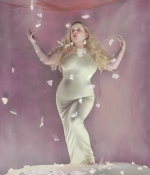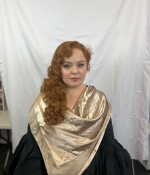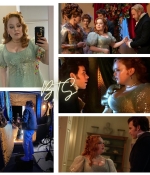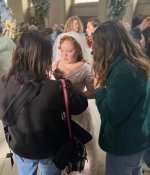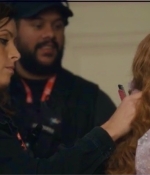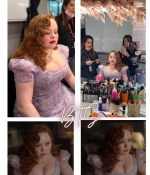Remember a time when Millennials were all over our screens (Girls, Fleabag, et al)? Then they just disappeared, probably to make avo toast or buy a house in the suburbs (joking – we can’t afford that). Now Big Mood – created by genius writer Camilla Whitehill – has delivered the TV resurrection of Millennials in all their messy angst.
The show follows two best friends: Maggie, a struggling playwright battling bipolar disorder, played by Bridgerton’s Nicola Coughlan, and Eddie, a Millennial Peggy Mitchell, played by It’s A Sin’s Lydia West. From shagging a former teacher to skirting sectioning, the show is as funny as it is powerful, covering tough ground, from mental health to abortion.
Shot in just seven weeks – and for half of it Coughlan was still shooting season three of Bridgerton, where her character Penelope Featherington takes the lead – Big Mood proves that Coughlan and West are fast becoming two of the greatest actors of their generation, with Whitehill firmly establishing herself as one of our most exciting writing talents.
We sat down with the trio to talk friendship break-ups, milestone anxiety and life’s rock bottoms.
Nicola and Camilla, you’ve been friends since you met at drama school 15 years ago. How proud are you to make this show together?
NICOLA: ‘We knew each other when we were living the struggle years simultaneously. I’ve never felt so personally invested in anything. Big Mood is like our baby.’
CAMILLA: ‘I’ve been a writer for 12 years and something that’s really good for your career is when your best friend gets famous and then you blackmail her to be in the show.’
Lydia, what was it like coming in as a newbie to the friendship?
LYDIA: ‘I didn’t think I’d get on with them both as much as I do. But we are so similar with our references to pop culture and reality TV, it’s just like, “Oh my god, I’ve met my people!”’
‘Big Mood’ really nails the Millennial experience…
NICOLA: ‘It’s about being in your thirties, being a little out of touch and not as cool as you once were.’
LYDIA: ‘I was on TikTok before giving birth [she had her first child this year] and I saw everyone had Stanley Cups. I was like, “This Stanley Cup will change my life, it will help my labour and it will make me so hydrated.” Then my 10-year-old cousin came around and said, “Oh my god, you’ve got a Stanley Cup? They’re so old now.”’
The show speaks to the intensity of female friendship, the highs and the lows. Is that something you can relate to?
LYDIA: ‘It made me reflect on the romance of friendship. There is so much emphasis on romantic partnerships, but platonic friendships are also very romantic.’
NICOLA: ‘I had friendship break-ups in my twenties that were really devastating ; your friends are so much part of who you are. It’s really sad – the stories get lost; experiences that only you two had together, you don’t have anyone to reminisce about those with. I find that heartbreaking.’
CAMILLA: ‘With romantic break-ups, people understand; they give you time and space. But if you’ve had a friendship break-up, it’s seen as a bit silly. We all know how important our friendships are. So why don’t we give it the same space?’
It also captures how your thirties can be a decade where you suddenly feel out of step with your friends and feel pressure to tick off certain boxes. Have you felt that?
NICOLA: ‘Oh, 100%. I’ve always felt like that, though. When I started acting I was very much like, “Why am I not one of the Olsen twins yet?” But I didn’t have a twin and I didn’t grow up in LA and I didn’t have stage parents. There were a lot of barriers!
‘It’s really uncomfortable and weird how different the phases of your life can be. My friends back home are married with kids and have “normal” jobs, and then my friends here, most are not married. It’s wild how different those two worlds are. Then you’re like, “Where do I fit?” It’s a tough time. But everyone’s the main character in their own story. I get really sensitive about stuff and then I have to go: it’s not about you. Comparison really is the thief of joy.’
CAMILLA: ‘The freedom of getting to my mid-thirties is that I’ve realised that everyone is very much on their own path and it’s nothing to do with you.’
LYDIA: ‘Getting married, buying a house – those things can feel really unattainable and then when you see friends do these things, you think, “They’ve got all their shit together.” But I have a young family and I feel just the same as when I was 29 and was lost and confused! I still feel like that now, but with a little human I’m raising. It’s hard to not get sucked into that idea of what you_should_ have achieved by this age and how far behind we feel based on our parents’ generation or the generation before us. We’re all just trying to figure it out and survive.’
The characters’ lowest moments are also some of their funniest. What have been your personal rock bottoms?
NICOLA: ‘Oh Christ. Do you remember my jigsaw phase? That was really rough. When I didn’t get into drama school I didn’t know what I was going to do with my life. So I moved back home and just started doing jigsaws. I don’t even really like jigsaws. It was a bad time.’
LYDIA ‘I’d say my lowest moment was after It’s A Sin came out and dealing with what to do next, feelings of impostor syndrome, feeling not good enough. What I did to get through it was pottery. I joined a pottery club and I had two pottery friends. They’re in their sixties and the three of us would go every weekend to just be on the wheel and catch up. It was using my hands and getting out of my head.’
The abortion episode – when Eddie has to resort to going to a private pink-themed clinic called Girl Borsh – is so impactful…
CAMILLA: ‘I wanted to represent how commonplace abortion is in women’s lives and how OK it is. But I also didn’t want to make fun of the act of getting one, I wanted to make fun of the way that we manage to “girl bossify” anything. The jokes in it have nothing to do with abortion itself. The jokes are to do with this weird space that we find ourselves in, where feminism is more about slogan T-shirts than it is about women’s rights.’
LYDIA: ‘What it highlights is how difficult it is for women in the UK to have abortions on the NHS and the waiting times. Eddie calls this hotline and they’re like, “Oh, you can go to Carlisle and it’ll be in seven weeks’ time.” Meanwhile, she’s pregnant, she’s chosen to have an abortion and she just wants to have the procedure. It’s already traumatic enough. I’m very, very pro-choice and it was interesting for me to play.’
Making a comedy about mental illness can’t be easy. How hard was it to get the tone right?
CAMILLA: ‘You can make anything funny. If I’d written this as a drama it would have been really bad, as I’m not a good drama writer. When you’re making something you shouldn’t be leading with an “issue”. If you want to do that, make a documentary.’
NICOLA: ‘As humans we crave levity. We crave the moment where we can just breathe. Life’s hard enough. People often think of times when they laughed at a funeral. There’s humour to be found everywhere.’
Grazia UK
Written by Josh Smith
Published April 29, 2024

